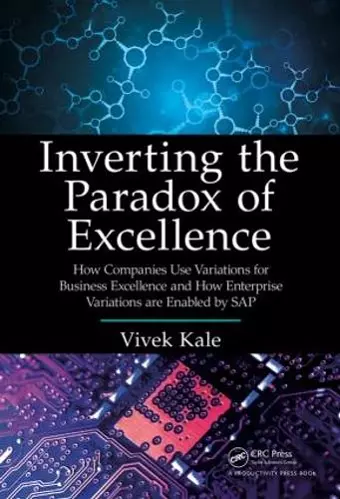Inverting the Paradox of Excellence
How Companies Use Variations for Business Excellence and How Enterprise Variations Are Enabled by SAP
Format:Hardback
Publisher:Taylor & Francis Inc
Published:14th Jul '14
Currently unavailable, and unfortunately no date known when it will be back

Over time, overemphasis and adherence to the same proven routines that helped your organization achieve success can also lead to its decline resulting from organizational inertia, complacency, and inflexibility. Drawing lessons from one of the best models of success, the evolutionary model, Inverting the Paradox of Excellence explains why your organization must proactively seek out changes or variations on a continuous basis for ensuring excellence by testing out a continuum of opportunities and advantages. In other words, to maintain excellence, the company must be in a constant state of flux!
The book introduces the patterns and anti-patterns of excellence and includes detailed case studies based on different dimensions of variations, including shared values variations, structure variations, and staff variations. It presents these case studies through the prism of the "variations" idea to help you visualize the difference of the "case history" approach presented here. The case studies illustrate the different dimensions of business variations available to help your organization in its quest towards achieving and sustaining excellence.
The book extends a set of variations inspired by the pioneering McKinsey 7S model, namely shared values, strategy, structure, stuff, style, staff, skills, systems, and sequence. It includes case history segments for Toyota, Acer, eBay, ABB, Cisco, Blackberry, Tata, Samsung, Volvo, Charles Schwab, McDonald's, Scania, Starbucks, Google, Disney, and NUMMI. It also includes detailed case histories of GE, IBM, and UPS.
Inverting the Paradox of Excellenceis a very comprehensive analysis of why good companies fail; and to maintain excellence, the company must be in a constant state of flux! Very convincingly, Vivek Kale demonstrates that competitiveness is not a state of being but a process of becoming excellent by monitoring and continuously adapting to the changing market realities.
—Jagdish N. Sheth, Charles H. Kellstadt Professor of Marketing, Goizueta Business School, Emory University, U.S.A
Vivek Kale offers many invaluable insights in his book,Inverting the Paradox of Excellence. Rather than proposing intuitively appealing prescriptions that can easily lead many firms astray, he advances a much more insightful perspective. That is, leaders must embrace the inherent tensions between stability and change; managing for the short-term and creating the future; as well as leveraging (or exploiting) an existing resource base and exploring for new opportunities. Failure is not to be avoided—it can lead to future success! He combines a sound conceptual rationale with many exciting examples of how to engage and benefit from the ‘paradox’ that he expertly communicates to the reader.
—Gregory Dess, Professor of Management, University of Texas at Dallas
Vivek Kale has written a ‘must-read’ book that tackles a challenging subject – what contributes to excellence in an organization and is sustaining. Vivek is very well qualified as an author and cognizant of the difficulty of the formidable task to write this book. He recognizes that previous books on this topic have showcased organizations that have subsequently failed, including bankruptcies. His approach to understand the contributors to business excellence includes a rarely written blend of executive leadership, business architecture, human nature, and technology.
—Gary Cokins, President, Analytics-Based Performance Management LLC; and author of Performance Management – Integrating Strategy Execution, Methodologies, Risk, and Analytics
The bookInverting the Paradox of Excellenceoffers a compelling look into why even the best companies fail, how the very reasons for their success can also lead to their eventual downfall. This well-researched and enlightening book cites example after example of how companies that maintain excellence have embraced variations as they adapt to a changing market.
—Greg Niemann, author of Big Brown: The Untold Story of UPS
Vivek Kale goes to the heart of the paradoxes of management and business. He draws together many theories and concepts from different disciplines to show how businesses are constantly evolving and changing. Success, as Darwin said, goes to those who can adapt best to their environment. This excellent book shows why adaptation is necessary, and how to do it. Further, taking SAP as a specific example, he shows how enterprise systems enable variations essential for business excellence.—Morgen Witzel, Fellow, Centre for Leadership Studies, University of Exeter; and author of A History of Management Thought
ISBN: 9781466592162
Dimensions: unknown
Weight: 946g
444 pages